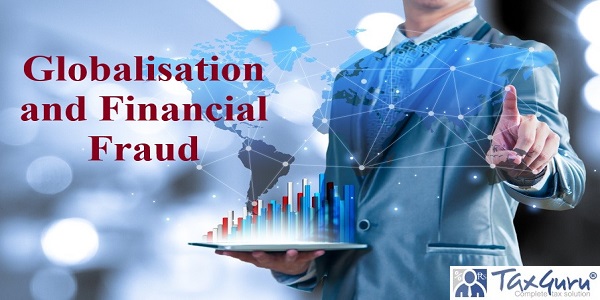INTRODUCTION
Globalization can be defined as the mixture of individual national economies into the international economic environment via different participation means. Globalization spurred two other revolutions– low-cost mass-transit facilities and international telecommunications (i.e., the Internet). Globalization led to Outsourcing, Off-shoring and Development of Global Service Infrastructure. But in recent times, crime has turned into a globalized activity.
FRAUD IN MASS TRANSIT FACILITIES
Transportation of goods and services across borders is a major component of globalization. Irregularities in export compliance regulations can lead to disastrous consequences. It is necessary for the companies and individuals to conduct themselves in an ethical manner. This is possible by adherence to corporate policies and execution of cross- border transactions.

FRAUD THROUGH TECHNOLOGICAL FACILITIES
Rapid advancement of wireless technology has proliferated opportunities for white-collar crimes. More criminal access to identities as schemes become more sophisticated. Further the growing size of global transactions adds to the difficulty of monetary transfers. Not only this, many cross-border transactions facilitated through professional services rather than financial institutions. There is a need for close co-operation of countries and international organizations in order to regulate and control fraudulent and financial activity.
PROBLEMS CONTRIBUTING TO GLOBAL FINANCIAL FRAUDS
Most importantly because of the vast globalisation, there is a confusion of Legal Jurisdiction. The flow of illicit goods in both corporate and the virtual worlds aided by illicit banking and financial services, has increased the problems. Further with the advancement in technology, there is a growing change in the nature of banks. The need of the hour is to harmonize legal codes and increase participation of law enforcement agencies.
ANALYSIS
The incidence and the cost of Globalized financial fraud rose up in the past years, in turn driving up companies sense of vulnerability. According to the latest survey, the level of fraud increased by every measure, reversing trends. More than 70% of companies reported suffering from at least one type of fraud in the past years. Individual businesses also faced a more diverse range of threats: on average, those hit suffered more than one, different types of fraud each. Finally, the economic cost of these crimes mounted, with 1 in 10 businesses reporting a cost of more than 4% of revenue.
Moreover, information related fraud is getting common and are evolving. But still many companies are not prepared for when things go wrong. Information theft, like most types of fraud, is typically an inside job: of those hit in the past year in which the attacker is known. 39% say it was the result of employee malfeasance. Nevertheless, greater exposure to fraud from IT complexity is being exploited increasingly by outsiders. Fraud however, remains an inside job. Global business practice often increased fraud exposure.
About 50 per cent of Indian executives interviewed for a global survey on fraud feel that corporate fraud is much more prevalent in India today than it was three years ago. And the same is felt about China. In both the countries, Corporates felt prone to bribes and corruption. Nearly every business at some point has been a victim of corporate fraud.
The extent to which industries experience corporate fraud varies according to the nature of their business. For example, Companies that deal with physical assets, such as consumer goods and retail, are more likely to suffer from the theft of physical assets or supplier fraud. Those who operate in the “knowledge economy“, such as professional services or technology, are more likely to be concerned about information theft or intellectual property issues.
CONCLUSION
One of the most unsavory aspects of globalization and a growing economy is the aspect of white-collar crime. In every industry, and in every aspect of the business world, there is the potential for a financial fraud to be carried out. Whether it is the P2P (Procure-to-Pay) or the Expense Reimbursement or the Payroll System, every accounting process can have control weaknesses. An insider or even a knowledgeable outside with a strong enough motive and opportunity can attempt to defraud the company.
The problems that we currently face with globalization as a process are the result of system of trade and finance that has developed faster than the regulatory framework in which trade occurs. As we move into the future, we can expect to see the regulatory frame work catch-up with the new reality of trade and finance. As of now the process of globalization is yet to complete.





